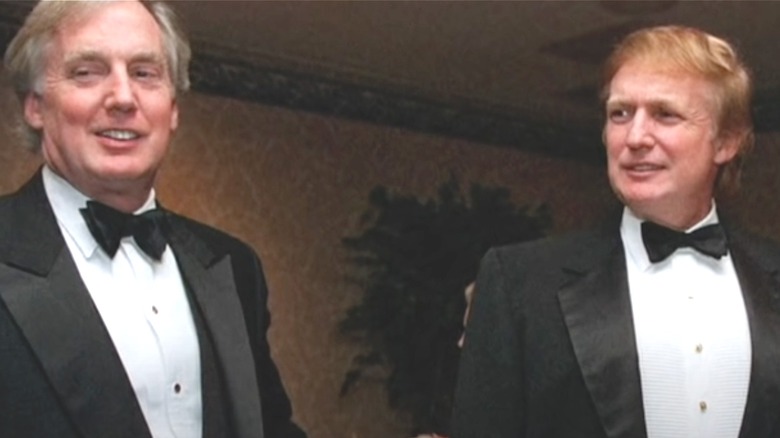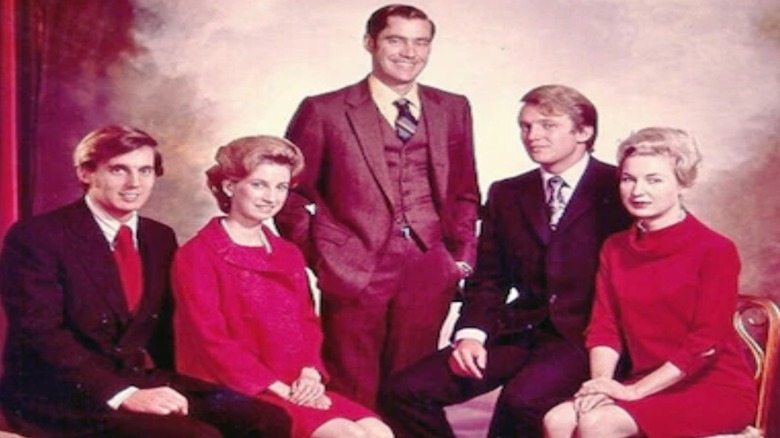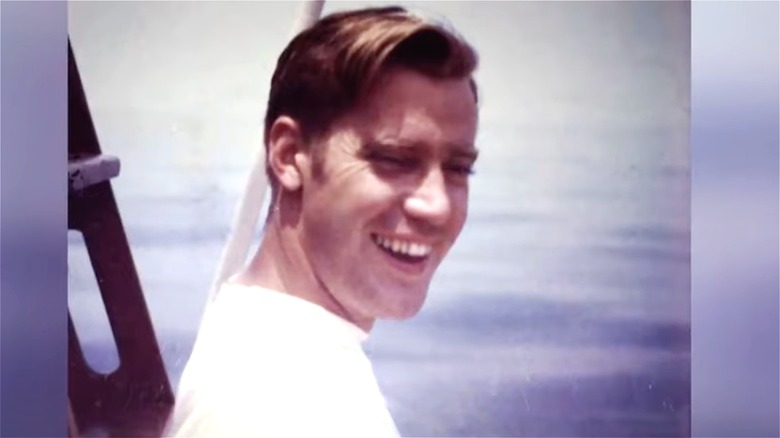The Tragic Truth About Donald Trump's Late Brother Fred Trump Jr.
They say a builder's home is always the house that needs the most repair, and it seems the same goes for politicians and their politicking. For somebody who loves to espouse the importance of "traditional" family values, Donald Trump's own genealogy could definitely do with some serious restoration work. For instance, his relationship with his late sibling, Fred Trump Jr., totally lacked any brotherly love and support.
But then, Fred Jr., Donald, and their younger brother, Robert Trump, could have done with some fatherly love. The same goes for Donald's sister, Maryanne Trump Barry, who was secretly recorded by her niece, Mary Trump — which is pretty messed up in itself — slamming Donald. In the tapes obtained by The Washington Post, Maryanne blasts her little bro for having "no principles" and claims "you can't trust him."
The recordings were released the day after Donald held a memorial for Robert, who died in August 2020. And, Donald being Donald, he didn't miss the opportunity to turn the double whammy of a personal scandal and a family tragedy into a good old-fashioned boasting opportunity. "Every day it's something else, who cares. I miss my brother, and I'll continue to work hard for the American people," Trump said in a statement (via AP). "Not everyone agrees, but the results are obvious. Our country will soon be stronger than ever before." It's not the most conventional and heartfelt obituary. Still, Donald didn't seem particularly phased by the death of Fred Jr. either.
Crushed dreams and desires
Donald Trump's brother, Fred Trump Jr., lived an unfulfilled and tragic life, resulting in his death at 42. Per The New York Times, Fred Jr. was obsessed with aviation from childhood. After graduating, he worked as a realtor until the pressure from his controlling father, Fred Trump Sr., became too much. So, Fred Jr. became a TWA pilot. He married a flight attendant, and they welcomed two kids, Fred and Mary Trump.
However, Donald and Fred Sr. had different plans for the free-spirited airman; they wanted him to do something biglyer. "Come on, Freddy, what are you doing? You're wasting your time," Donald reportedly told him, according to The Washington Post. Meanwhile, Fred Sr. claimed working as a pilot was akin to being "a chauffeur in the sky." The two insisted instead that Fred Jr. return to the family business.
Fred Jr.'s frat brothers remembered him as a fun-loving guy who was "the campus jokester" and the polar opposite of his younger brother. "He was as far from Donald's personality as you can get," Fred Jr.'s pal Mel Bergstein said. However, he turned to alcohol as he struggled with his family's demands to ditch happiness in pursuit of cold, hard cash. Three of Fred Jr.'s fellow TWA pilots claimed they noticed his alcohol intake increase as the stress he was under from his father and brother increased. Ultimately, TWA fired Fred Jr., so he towed the party line and spiraled into a life of misery and alcoholism.
A cautionary tale
Donald Trump's niece, Mary Trump, wrote in her book "Too Much and Never Enough" that following her father's death, Donald pondered aloud if things would have turned out differently if he and Fred Trump Sr. had let Fred Trump Jr. "do what he loved and excelled at [flying] rather than force him to do something he hated [real estate]."
Mary claimed Fred Sr. abused both Donald and Fred Jr. Still, Donald applauded his father's castigation and branded Fred Jr. as weak for struggling to deal with it. "Dad's not trying to hurt Freddy," he allegedly said. "He's only trying to teach us how to be real men. And Freddy's failing." Mary also claimed that Donald chose to go to the movies rather than be with his brother as he lay dying in a hospital bed from an alcohol-induced heart attack, according to The New York Times.
Meanwhile, Donald has used his sibling's tragic death to act as a cautionary tale for others. "I had a brother Fred, great guy, best-looking guy, best personality, much better than mine," he said to peels of laughter. "But he had a problem, a problem with alcohol." However, despite witnessing firsthand the extent of Fred Jr.'s struggle with substance abuse disorder, Donald has a limited grasp on the causes and effects of addiction. He claimed that by teaching "people generally not to [start drinking or taking drugs], it's really, really easy not to take them." Well, that's the US opioid epidemic sorted, then.



